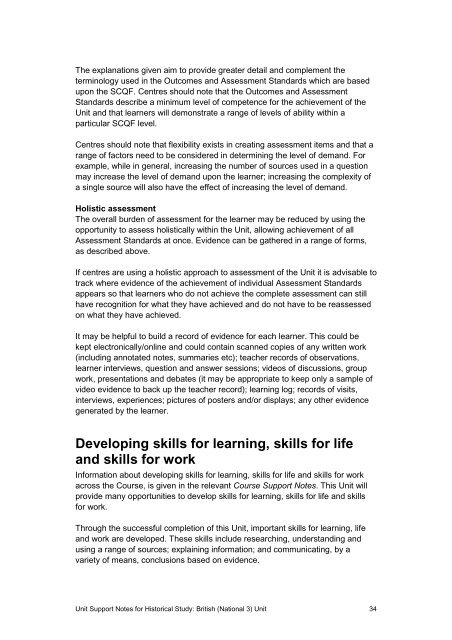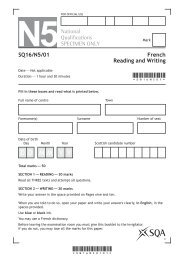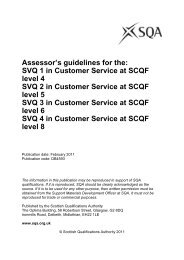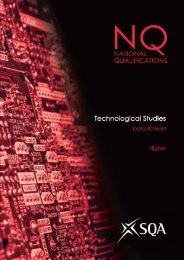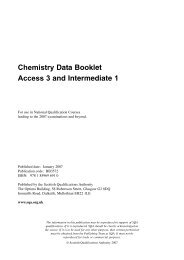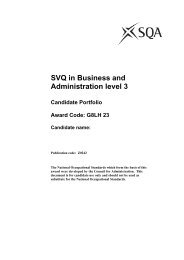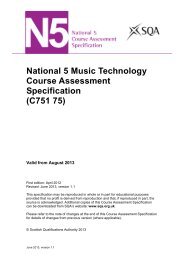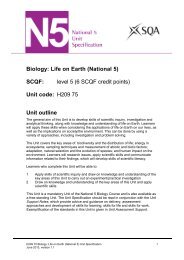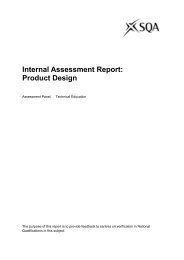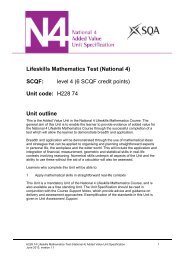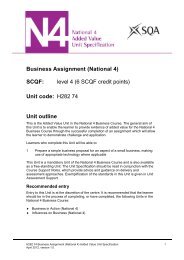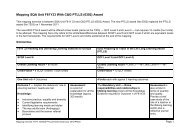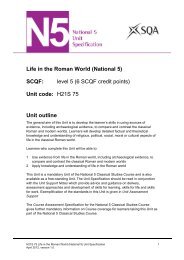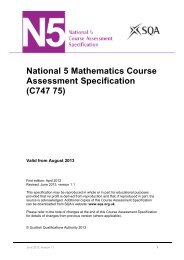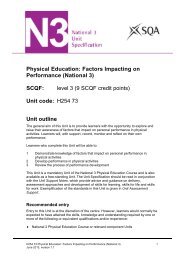National 3 History Course Support Notes - Scottish Qualifications ...
National 3 History Course Support Notes - Scottish Qualifications ...
National 3 History Course Support Notes - Scottish Qualifications ...
Create successful ePaper yourself
Turn your PDF publications into a flip-book with our unique Google optimized e-Paper software.
The explanations given aim to provide greater detail and complement the<br />
terminology used in the Outcomes and Assessment Standards which are based<br />
upon the SCQF. Centres should note that the Outcomes and Assessment<br />
Standards describe a minimum level of competence for the achievement of the<br />
Unit and that learners will demonstrate a range of levels of ability within a<br />
particular SCQF level.<br />
Centres should note that flexibility exists in creating assessment items and that a<br />
range of factors need to be considered in determining the level of demand. For<br />
example, while in general, increasing the number of sources used in a question<br />
may increase the level of demand upon the learner; increasing the complexity of<br />
a single source will also have the effect of increasing the level of demand.<br />
Holistic assessment<br />
The overall burden of assessment for the learner may be reduced by using the<br />
opportunity to assess holistically within the Unit, allowing achievement of all<br />
Assessment Standards at once. Evidence can be gathered in a range of forms,<br />
as described above.<br />
If centres are using a holistic approach to assessment of the Unit it is advisable to<br />
track where evidence of the achievement of individual Assessment Standards<br />
appears so that learners who do not achieve the complete assessment can still<br />
have recognition for what they have achieved and do not have to be reassessed<br />
on what they have achieved.<br />
It may be helpful to build a record of evidence for each learner. This could be<br />
kept electronically/online and could contain scanned copies of any written work<br />
(including annotated notes, summaries etc); teacher records of observations,<br />
learner interviews, question and answer sessions; videos of discussions, group<br />
work, presentations and debates (it may be appropriate to keep only a sample of<br />
video evidence to back up the teacher record); learning log; records of visits,<br />
interviews, experiences; pictures of posters and/or displays; any other evidence<br />
generated by the learner.<br />
Developing skills for learning, skills for life<br />
and skills for work<br />
Information about developing skills for learning, skills for life and skills for work<br />
across the <strong>Course</strong>, is given in the relevant <strong>Course</strong> <strong>Support</strong> <strong>Notes</strong>. This Unit will<br />
provide many opportunities to develop skills for learning, skills for life and skills<br />
for work.<br />
Through the successful completion of this Unit, important skills for learning, life<br />
and work are developed. These skills include researching, understanding and<br />
using a range of sources; explaining information; and communicating, by a<br />
variety of means, conclusions based on evidence.<br />
Unit <strong>Support</strong> <strong>Notes</strong> for Historical Study: British (<strong>National</strong> 3) Unit 34


